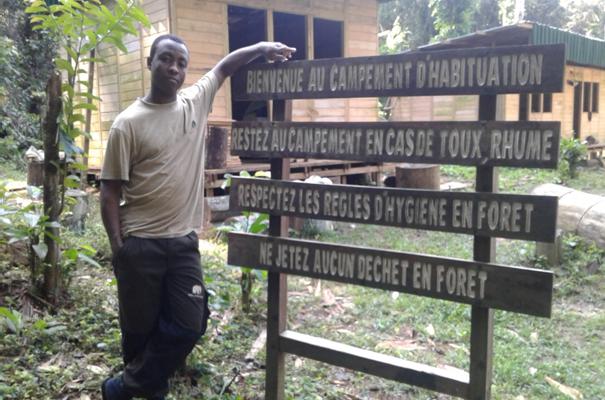Fotsing Ernest Dadis Bush
Since several year in the world, Congo basin and Cameroon especially (in Campo’o Man’AN to be precise), we have noted that the anthropogenic pressure and other factors apply on the habitat of the animals are accentuated with a significant reduction of animals and theirs foods resources in theirs living habitat. In front of these threats, we wonders about the strategies developed by animals in general but, primates (especially gorilla gorilla) in particular for better adapting to the ceaseless variations of their middle life but, also to the relationship between the availability of the resources and their needs. Collect behavioural, feeding and anthropogenic data using phenology data collection, group scan, focal animals sampling, transects and reccees within the home range of the studied group of gorilla will contribute to assess the influence of food availability and anthropogenic pressure on the gorilla behaviour. Obtained those data can also contribute for durable management plan of conservation of the species.

Gorilla habituation camp.
The African gorilla is hunted primarily for food and for their meat selling. Effective conservation measures and sustainable programs of conservation require knowledge of population ecology and effect of hunting pressure on theirs behaviour. In this local context of pressure applied on this species and on theirs living habitats, we think that knowing the types of strategies developed in a group of the same species living in groups or between species in the same group who have very similar diets would be a step in setting sustainable conservation plan for implementing primate species. In fact, this work which highlights interactions existing between local populations, environment and gorilla will not only be essential for better understanding capacities of adaptations of these animals to the disturbances applied on their habitats, but, also to : made a good evaluation of the threats level to the local context ; make and evaluation of the level of gorilla habituation occur in the site ; and to see how can be ecotourism in this areas. Work focuses on three main objectives:
1- investigate the feeding ecology and impact of anthropogenic pressure on the behaviour of the study group
2- investigate the food availability in the study group’s home range and the gorilla feeding choice
3- set the baseline data needed to monitor the long-term impact of gorilla tourism in Campo Ma’An National Park and to guide project managers towards impact optimization guidelines and activities.
Results will also allow us to better understand ecological and behavioural answer of these gorilla faces to the high level of pressure applied on their habitats and, in the long term to direct the strategies of conservation in other to allow harmony living between human (local population) and gorilla in the areas. In the other hand, result of the study can also help to improve management and stewardship of biodiversity and will equally help to reduce human-wildlife conflicts in this areas. Definitively, results of this project will help to improve our understanding about our currently living environment and the nature response face to the accelerating global change, and/or informing local, regional, national or international management biodiversity and conservation plans and policies.